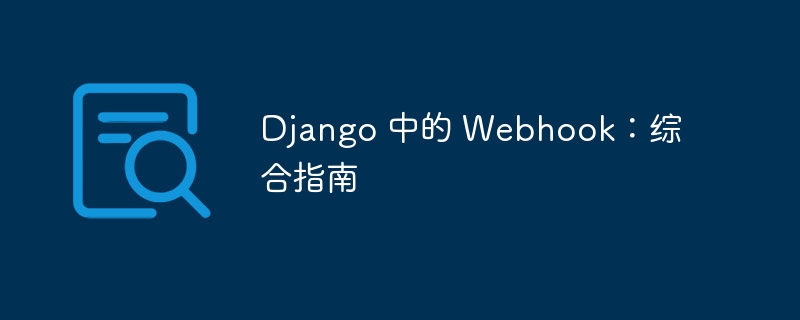Django 中的 Webhook:综合指南(指南.综合.Django.Webhook...)

webhooks 是创建实时事件驱动应用程序的强大功能。在 django 生态系统中,它们使应用程序能够近乎实时地对外部事件做出反应,这使得它们对于与第三方服务(例如支付网关、社交媒体平台或数据监控系统)的集成特别有用。本指南将介绍 webhook 的基础知识、在 django 中设置它们的过程,以及构建健壮、可扩展且安全的 webhook 处理系统的最佳实践。
什么是 webhook?webhooks 是 http 回调,每当特定事件发生时,它就会将数据发送到外部 url。与您的应用程序请求数据的传统 api 不同,webhooks 允许外部服务根据某些触发器将数据“推送”到您的应用程序。
例如,如果您的应用程序与支付处理器集成,则每次支付成功或失败时,webhook 可能会通知您。事件数据(通常采用 json 格式)作为 post 请求发送到应用程序中的指定端点,使其能够根据需要处理或存储信息。
为什么使用 webhook?webhooks 提供了反应式和事件驱动的模型。他们的主要优点包括:
- 实时数据流:事件发生后立即接收更新。
- 减少轮询:无需不断检查更新。
- 简单集成:与 stripe、github 或 slack 等第三方服务连接。
- 可扩展性:有效处理大量事件和响应
在 django 中实现 webhook 涉及创建专用视图来接收和处理传入的 post 请求。让我们完成这些步骤。
第 1 步:设置 webhook url创建专门用于处理 webhook 请求的 url 端点。例如,假设我们正在为支付服务设置一个 webhook,该服务会在交易完成时通知我们。
在 urls.py 中:
from django.urls import path
from . import views
urlpatterns = [
path("webhook/", views.payment_webhook, name="payment_webhook"),
]
第 2 步:创建 webhook 视图
视图处理传入的请求并处理接收到的数据。由于 webhooks 通常发送 json 有效负载,因此我们将首先解析 json 并根据有效负载的内容执行必要的操作。
在views.py中:
import json
from django.http import jsonresponse, httpresponsebadrequest
from django.views.decorators.csrf import csrf_exempt
@csrf_exempt # exempt this view from csrf protection
def payment_webhook(request):
if request.method != "post":
return httpresponsebadrequest("invalid request method.")
try:
data = json.loads(request.body)
except json.jsondecodeerror:
return httpresponsebadrequest("invalid json payload.")
# perform different actions based on the event type
event_type = data.get("event_type")
if event_type == "payment_success":
handle_payment_success(data)
elif event_type == "payment_failure":
handle_payment_failure(data)
else:
return httpresponsebadrequest("unhandled event type.")
# acknowledge receipt of the webhook
return jsonresponse({"status": "success"})
第 3 步:实现辅助函数
为了保持视图的简洁和模块化,最好创建单独的函数来处理每个特定的事件类型。
def handle_payment_success(data):
# extract payment details and update your models or perform required actions
transaction_id = data["transaction_id"]
amount = data["amount"]
# logic to update the database or notify the user
print(f"payment succeeded with id: {transaction_id} for amount: {amount}")
def handle_payment_failure(data):
# handle payment failure logic
transaction_id = data["transaction_id"]
reason = data["failure_reason"]
# logic to update the database or notify the user
print(f"payment failed with id: {transaction_id}. reason: {reason}")
步骤4:在第三方服务中配置webhook
设置端点后,在您要集成的第三方服务中配置 webhook url。通常,您会在服务的仪表板中找到 webhook 配置选项。第三方服务还可能提供选项来指定哪些事件应触发 webhook。
webhook 的安全最佳实践由于 webhooks 向外部数据开放您的应用程序,因此遵循安全最佳实践对于防止误用或数据泄露至关重要。
- 使用身份验证令牌:包含共享密钥或令牌来验证传入请求。许多服务在请求标头中提供了您可以验证的签名。
import hmac
import hashlib
def verify_signature(request):
secret = "your_shared_secret"
signature = request.headers.get("x-signature")
payload = request.body
computed_signature = hmac.new(
secret.encode(),
payload,
hashlib.sha256
).hexdigest()
return hmac.compare_digest(computed_signature, signature)
- 速率限制 webhooks:通过限制端点在一段时间内可以处理的请求数量来防止滥用。
- 快速响应:webhooks 通常需要快速响应。避免在视图中进行复杂的同步处理以防止超时。
- 用于繁重处理的队列任务:如果 webhook 处理涉及长时间运行的任务,请使用像 celery 这样的任务队列来异步处理它们。
# example of celery task usage
from .tasks import process_payment_event
@csrf_exempt
def payment_webhook(request):
if request.method == "post":
data = json.loads(request.body)
process_payment_event.delay(data) # queue the task for async processing
return jsonresponse({"status": "accepted"})
return httpresponsebadrequest("invalid request method.")
测试网络钩子
测试 webhooks 可能具有挑战性,因为它们需要外部服务来触发它们。以下是一些常见的测试方法:
- 使用像 ngrok 这样的服务:ngrok 创建一个临时公共 url,将请求转发到本地开发服务器,允许第三方服务向其发送 webhooks。
- 模拟请求:从测试脚本或django的manage.py shell手动触发对webhook端点的请求。
- django 的测试客户端:通过模拟 post 请求为 webhook 视图编写单元测试。
from django.test import TestCase, Client
import json
class WebhookTest(TestCase):
def setUp(self):
self.client = Client()
def test_payment_success_webhook(self):
payload = {
"event_type": "payment_success",
"transaction_id": "12345",
"amount": 100
}
response = self.client.post(
"/webhook/",
data=json.dumps(payload),
content_type="application/json"
)
self.assertEqual(response.status_code, 200)
self.assertEqual(response.json(), {"status": "success"})
结论
webhook 是创建实时事件驱动应用程序的重要组成部分,django 提供了安全有效地实现它们所需的灵活性和工具。通过遵循设计、模块化和安全性方面的最佳实践,您可以构建可扩展、可靠且有弹性的 webhook 处理。
无论是与支付处理器、社交媒体平台还是任何外部 api 集成,django 中实施良好的 webhook 系统都可以显着增强应用程序的响应能力和连接性。
以上就是Django 中的 Webhook:综合指南的详细内容,更多请关注知识资源分享宝库其它相关文章!
